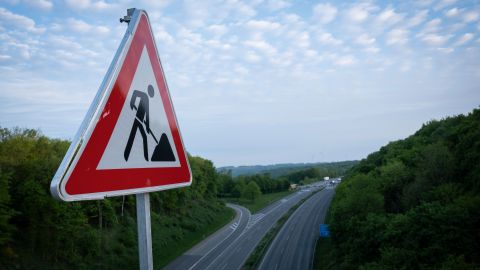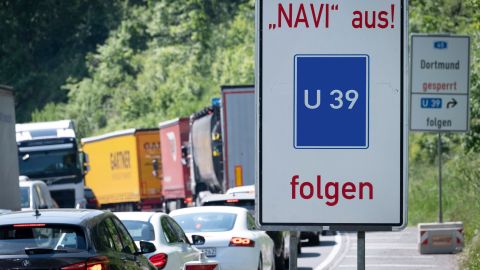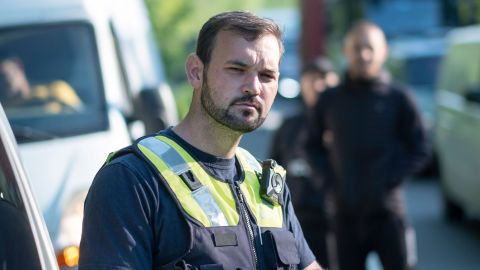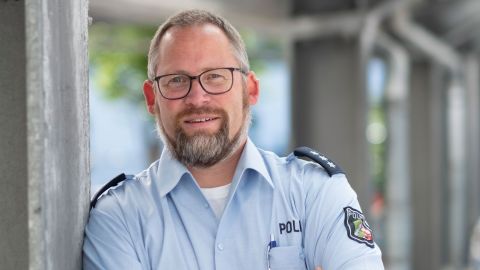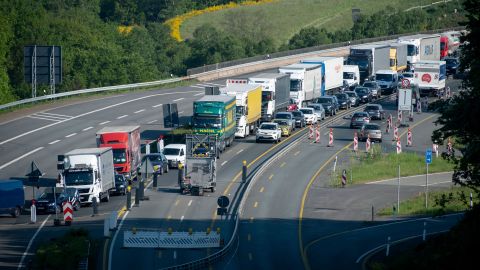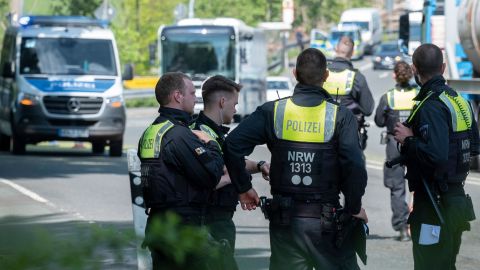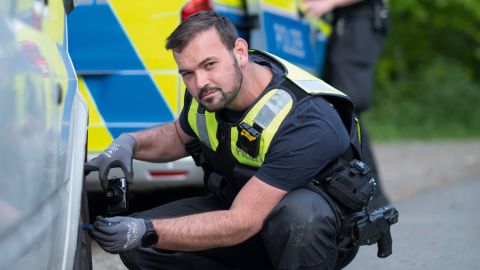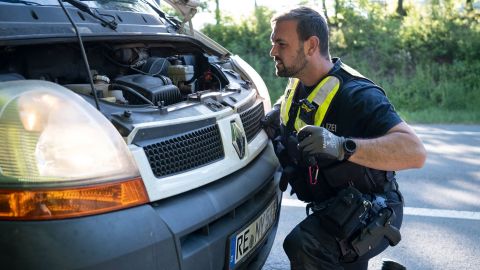The day hasn't even really started when Erik Blume is already lying underneath a white van, looking at its underbody. On the A45 Sauerland route, on his way to work, the police superintendent has forced the battered vehicle to stop. The vehicle from the Ruhr area is leaking a lot of oil, the brake pads are badly worn and the flashing engine control light is hard to miss. "The defects are not so serious that the mini truck has to be taken out of circulation immediately and the driver can no longer take his load to the weekly market in Lüdenscheid," judges the 37-year-old from the traffic service of the Märkischer Kreis police. "However, the driver and owner will definitely be charged. And an inspection report so that the owner can rectify the defects immediately."
Erik Blume and his colleagues from the police in and around Lüdenscheid have been working in a kind of state of emergency since the end of last year. The closure of the Rahmede viaduct on the A45 has massively increased their workload. At the same time, life in the district town and its 70,000 inhabitants has come to a standstill in the truest sense of the word. Since the complete closure of the section of the A45, traffic has been routed via detour (U16/ U39) through the middle of the city. These routes run in opposite directions between the Lüdenscheid-Nord and Lüdenscheid junctions. A never-ending train of red brake lights winds its way through the municipality in the north-west of the Sauerland region: 25,000 vehicles - including 6,000 trucks - clog up the inner-city roads day and night.
The drama surrounding the dilapidated Rahmede viaduct began on December 2, 2021. On this day, deformations were found in the superstructure during a laser scan inspection of the structure. These lead to an immediate closure of the A 45 between Lüdenscheid-Nord and Lüdenscheid - in both directions and for all traffic. The 453-metre-long bridge, which was built between 1965 and 1968, simply can't take any more: when it was built, the planners assumed a maximum load of 25,000 vehicles per day. By the end of the 2010s, this figure had risen to 64,000, 13,000 of which were trucks. These were previously allowed to weigh a maximum of 32 tons; in 2021, the maximum permissible weight was up to 44 tons. Further investigations in January 2022 revealed even more damage (cracks in the load carriers). This finally sealed the fate of the approximately 70-meter-high structure. Even a temporary use for cars only is no longer an option. The bridge is to be blown up in the course of this year. When a replacement structure could be ready is still written in the stars. It was once said that the new Morandi Bridge in Genoa, which was completed in two years, was to be used as a model. At the beginning of January 2022, the responsible federal highway company estimated the duration of the new construction to be five years. A precise plan has yet to be drawn up.
"The closure will affect traffic in the entire Märkischer Kreis district and the impact will be felt throughout the region," says Armin Kibbert (48) from the police traffic control center in Lüdenscheid. Many drivers have reacted to the omnipresent traffic jams by taking their own routes. Some of the car and heavy goods vehicles are using their cell phones and/or navigation systems to find shortcuts and alternative routes. Schools, kindergartens, residential areas? It doesn't matter, the main thing is to move faster. Kibbert: "Together with the city of Lüdenscheid and Straßen.NRW, we have ordered comprehensive traffic bans to force traffic onto the designated routes. But of course not all car and truck drivers comply with this order." A major problem are the many foreign truck drivers who are guided directly into the restricted areas by their navigation systems or Google Maps.
Whether intentionally or misguided - the vehicles do not belong there. The control pressure is to be kept correspondingly high, and the condition of the vehicles, their speed and authorization to drive through must be checked anew every day. Before the summer vacations in North Rhine-Westphalia, priority checks were carried out for ten weeks in addition to the daily operations of the Lüdenscheid police. Police forces from the surrounding area - for example, the police units from Dortmund and Wuppertal - were repeatedly deployed.
"The traffic service has a special task here. It is responsible for the technical monitoring of freight traffic, but also for school buses, hazardous goods transporters and bicycles," emphasizes Chief Superintendent Kibbert. Almost every day, Erik Blume and his 16 colleagues immobilize vehicles, especially small trucks, due to technical defects. Since the inspections began in December 2021, there have already been more than 140 by the beginning of May, some of which are in a completely desolate technical condition. This means that the trucks and vans, which often come from Eastern Europe, pose a danger not only to their drivers and passengers. This also applies to the populated areas, nurseries and schools that they squeeze past.
Police Superintendent Blume, who moved his place of work from Lüdenscheid to Iserlohn because the traffic jams caused by the bridge closure would otherwise have doubled his journey to work to 90 minutes (one way, of course), recalls a case at the turn of the year 2021/22: "We checked a group of travellers from the Republic of Moldova at the time. To save on fuel costs, their bus had a 300-liter spare tank that was improperly and provisionally fixed under the floor assembly of the bus." To prevent the precious diesel from dripping onto the asphalt through a proper overflow, the fuel (including highly flammable vapors) was collected using a PET bottle. This in turn was placed directly in the engine compartment next to the shaky and pole-free battery. As a result, there was a highly flammable source right next to an electrical circuit. Erik Blume: "One spark and everything would have been on fire."
Nine months after the bridge was closed, the police in Lüdenscheid are still constantly adjusting individual traffic management measures in consultation with the town and Straßen.NRW. For example, a traffic light system with priority switching for the detour was initially set up at an intersection of two country roads without traffic lights. However, this did not really solve the traffic jam problem. A dynamic traffic light is now in use, which reacts automatically to the situation on the two roads. This at least makes things a little less bad.
The situation in Lüdenscheid is exacerbated by the lack of a bypass. An additional problem: "There is a huge amount of industry in the town itself, so the area cannot be completely closed to heavy goods traffic. Delivery traffic must still be possible," emphasizes Mareen Weische, Head of the Traffic Directorate of the Märkischer Kreis district police authority. In many places, however, the roads and their road surfaces are not designed for this. There will soon be detours for the detour, which will have to be upgraded. This will not improve the mood in the city. "The nerves of many of those affected are frayed. Drivers don't understand the driving bans, residents want more of them," says the 40-year-old senior police officer. "Our officers have to do their job every day in this area of tension. And the way they have done this since the end of 2021 simply deserves the highest praise."
"We experience the full range of reactions to our work," confirms Erik Blume, who has worked for the traffic service since 2018. Angry, annoyed, aggressive, neutral - it's all there. "Many drivers are very critical of us, but when the expert agrees with our assessment and confirms that we are actually protecting drivers' lives, they are grateful." The success of the traffic service is based not least on the fact that knowledge is passed on from older to younger colleagues. Added to this is classic "learning by doing". Blume: "When we get into the pit with the experts, we naturally pick up an incredible amount of know-how." For example, no car poser can fool him when it comes to tuning.
The police superintendent has barely crawled out from under the mini truck from the police station when his colleagues have already stopped another van. This time, it wasn't the condition of the vehicle that caught the officers' attention, but something completely different: an alleged craft business from Luxembourg with Recklinghausen license plates. "Many companies sell their vehicles and the new owners leave the old advertising on the vehicles as camouflage, which they use for illegal scrap collection, for example," says Erik Blume. A look inside the vehicle confirms the suspicion: the side door is specially covered and secured with a plate so that everything can be thrown in quickly if the worst comes to the worst and it doesn't spring open. However, the car is still completely empty - apart from a few tools. But when the police check the papers, they discover that there is an arrest warrant for the passenger. That's why they first go to the police station. Further checks are then carried out.
